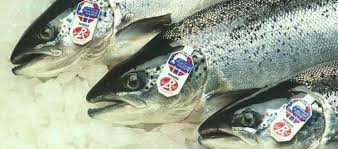Comment: Why Changing Markets must change their tune

THE sensationalist headlines above a new report from a lobbying group called the Changing Markets Foundation ran alarm bells in the Fish Farmer newsroom yesterday.
If the organisation’s marketing team hadn’t taken the trouble to call before sending their press release, I probably would have ignored it, along with all the others that arrive from conservation NGOs with apparent vendettas against global aquaculture.
But I took a few minutes with this one, long enough to realise that it was yet more propaganda from a campaigner that had already launched an attack on the marine ingredients (and therefore also on the fed aquaculture) sector earlier this year.
In April, the foundation issued a report, ‘Until the Seas Run Dry: How industrial aquaculture is plundering the oceans’.
Its latest publication again questions the sustainability of the fishmeal and fish oil used in aquaculture across the world. And it attempts to link UK supermarkets with illegal fishing in India, Vietnam and the Gambia, throwing farmed salmon in for good measure.
Again, the lobby group directs its grievances at the aquaculture sector, rather than other food or pet food industries which also use fishmeal and fish oil in diets.
As a general journalistic rule, if the first couple of sentences of a press release are untrue, there is no need to read on, and certainly no need to publish.
The Changing Markets report, headlined ‘Farmed fish diets wiping out wild fish stocks in Asia and Africa’, included this quote from the foundation’s Natasha Hurley: ‘The boom in aquaculture, to match the global demand for premium seafood products such as salmon, is fuelling illegal and unsustainable fishing practices which are stripping the oceans bare.’
This is simply a false statement. As the Scottish Salmon Producers Organisation pointed out: ‘Companies providing feed for Scottish farm raised salmon have confirmed that none of them uses ingredients from the Gambia, Vietnam or India or from reef fishing – the main thrust of the criticism highlighted in the report.
‘Any claim or suggestion that Scottish feed suppliers are sourcing from these fisheries would be wrong, misleading and inaccurate.
‘Scotland’s feed suppliers will continue to ensure their ingredients are sourced from responsible and sustainable fisheries, allowing Scotland’s salmon farmers to achieve the best feed conversion ratios of any livestock, thus ensuring best use of marine resources.’
The campaigners at Changing Markets bandy the word ‘salmon’ about, even though it is not strictly relevant to its report, because they know they will get traction among anti-salmon farming activists.
Salmon farmers – not just in Scotland – are used to such negative publicity and try to counter it by flagging up the low carbon emissions of farmed salmon production, the health benefits of its omega-3 content, and the role aquaculture plays in global food security.
But an organisation like Changing Markets (whose founders are ex-Greenpeace) is potentially even more damaging in the threat it poses – through its anti-aquaculture agenda – to the burgeoning farming businesses in poorer countries.
Just as fledgling farmers in the third world are trying to establish their enterprises and find markets, along comes a first world, self-appointed sustainability watchdog to undermine their efforts.
‘To address sustainability, we need to withdraw our support for those companies that are damaging society,’ said Changing Markets.
‘If we do so at scale, we can create a self-reinforcing accelerating loop of positive change in global markets – change defined by the most sustainability focused companies succeeding and forcing others to follow their lead.’
Will their ‘self-reinforcing accelerating loop’ do anything to encourage the global development of aquaculture – a critical source of food for millions of people?
We would urge the Changing Markets Foundation to better understand the industry that is in their sights before cobbling together their next report.
Fish farming has been good for the poor, according to the learned authors of an article, ‘Fish farms are helping to fight hunger’, published on The Conversation website last year.
‘To understand the potential of aquaculture to feed the world, researchers and consumers need to appreciate how dynamic this industry is,’ wrote Ben Belton, Dave Little and Simon Bush. (click here)
‘The vast majority of farmed fish is consumed in the same developing countries where it is produced, and is widely accessible to poorer consumers in these markets. Most of it comes from a dynamic new class of small- and medium-scale commercial farms, the existence of which is rarely recognised.’
That, and the fact that internationally traded species such as shrimp, salmon, and pangasius account for less than 10 per cent of global farmed fish production, may not attract the headlines Changing Markets is looking for – but it is at least true.

